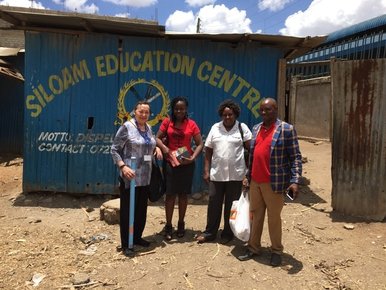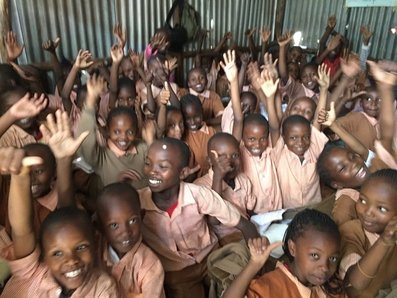Eganville Rotary International Project in Nairobi Kenya - March 2017
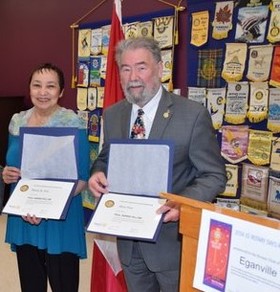 Mona and Alan at Paul Harris Fellowship ceremony
Mona and Alan at Paul Harris Fellowship ceremony
For several years, The Rotary Club of Eganville, in partnership with other Rotary Clubs in the Ottawa Valley, the United Kingdom and Kenya and many private donors, have been supporting the Imara Healthcare Clinic in the Mukuru slums of Nairobi. (see the Imara Project page for a history) The latest project, which includes a grant of $9115.00 US from Rotary District 7040, is to purchase operating theatre equipment for the clinic. This recent project has a cost of $23,600.00 CAD. On March 15th 2017 Eganville Rotarians Mona and Alan Fox left Canada for Nairobi to visit the clinic and witness the delivery and installation of the sponsored medical equipment. The following page(s) will chronicle, in first person format, Mona and Alan's experiences which on their journey.
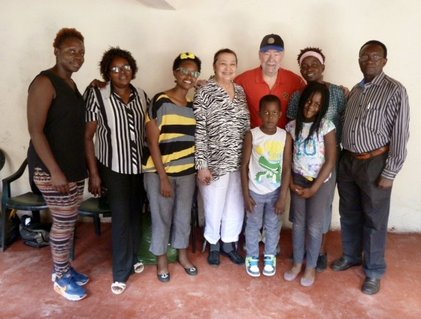 Rotarian Katie, Francisca, President Sidy, Mona, Alan, Isabella, Peter ,Tedd & Gaudie
Rotarian Katie, Francisca, President Sidy, Mona, Alan, Isabella, Peter ,Tedd & Gaudie
Wednesday/Thursday March 15th & 16th
For a few moments it looked as though we were not going to be able to fly to Nairobi as planned because our flight to Montreal was cancelled due to the weather.
However, the Air Canada agents were able to re-route us through Toronto and on to Frankfurt and Nairobi and we arrived at our destination on time. Peter and Francisca as well as Isabella, our hostess for our 12 day stay in Nairobi, were at the airport to meet us.
Friday, March 17th
After a night on the plane to Frankfurt and then another flight of over seven hours to Nairobi we slept well and late at Isabella’s home. We met her husband Barrack in the morning as he was out of town on the day of our arrival. He is Head of Regional Network Operations for Safaricom, the large telecommunications company that transacts some 95% of Kenya’s internet business. Isabella who is the Rotarian in the family, owns and manages a gymnasium. Then after school we met their two children – their daughter, Gaudi, aged 8 and son, Tedd, aged 6 as well as some of their neighbourhood friends. It was a pleasant, lazy day, catching up with sleep, relaxing and getting to know our host family. Tomorrow we will go to Imara and meet Peter and Francisca to make plans for the busy week ahead.
For a few moments it looked as though we were not going to be able to fly to Nairobi as planned because our flight to Montreal was cancelled due to the weather.
However, the Air Canada agents were able to re-route us through Toronto and on to Frankfurt and Nairobi and we arrived at our destination on time. Peter and Francisca as well as Isabella, our hostess for our 12 day stay in Nairobi, were at the airport to meet us.
Friday, March 17th
After a night on the plane to Frankfurt and then another flight of over seven hours to Nairobi we slept well and late at Isabella’s home. We met her husband Barrack in the morning as he was out of town on the day of our arrival. He is Head of Regional Network Operations for Safaricom, the large telecommunications company that transacts some 95% of Kenya’s internet business. Isabella who is the Rotarian in the family, owns and manages a gymnasium. Then after school we met their two children – their daughter, Gaudi, aged 8 and son, Tedd, aged 6 as well as some of their neighbourhood friends. It was a pleasant, lazy day, catching up with sleep, relaxing and getting to know our host family. Tomorrow we will go to Imara and meet Peter and Francisca to make plans for the busy week ahead.
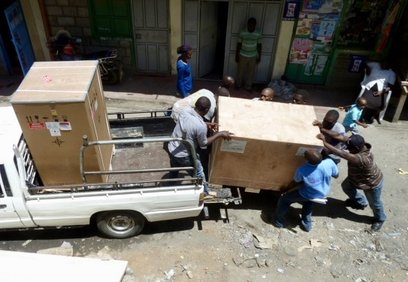 The equipment arrives
The equipment arrives
Saturday, March 18th
Saturday was a planning day. It was nice to finally meet President Sidy from RC Syokimau and her Program Director, Katie Simba, having corresponded with them both over the last few months. We met at the Imara Centre and with Peter and Francisca, and made plans for Monday’s reception. About 60 guests are expected, including the Canada-India Fellowship Delegation led by PDG Bill Gray.
It was good to meet again some of the staff at the Imara Centre that we had met on previous visits, including Hadijah, Joy, Agnes and Suzie. We gave Francisca some 50 baby hats that were knitted by a knitting circle in the UK and Anne Humphries in Renfrew. We were able to give hats to two infants that were born the previous day.
The medical equipment that had been purchased under a District 7040 grant was delivered on Saturday. It arrived in two large crates and some smaller boxes in the back of a truck and with the help of some men on the street was unloaded and manoeuvered into the new Operating room at the Centre. It was good to see that the equipment had arrived safely in time for Monday’s reception.
Our hosts, Barack and Isabelle came over to the Centre in the afternoon with their children and Barack very generously offered to support the cost of having the entire Centre painted. After all the renovations that have taken place recently a paint job is badly needed and will transform the look of the Centre.
Saturday was a planning day. It was nice to finally meet President Sidy from RC Syokimau and her Program Director, Katie Simba, having corresponded with them both over the last few months. We met at the Imara Centre and with Peter and Francisca, and made plans for Monday’s reception. About 60 guests are expected, including the Canada-India Fellowship Delegation led by PDG Bill Gray.
It was good to meet again some of the staff at the Imara Centre that we had met on previous visits, including Hadijah, Joy, Agnes and Suzie. We gave Francisca some 50 baby hats that were knitted by a knitting circle in the UK and Anne Humphries in Renfrew. We were able to give hats to two infants that were born the previous day.
The medical equipment that had been purchased under a District 7040 grant was delivered on Saturday. It arrived in two large crates and some smaller boxes in the back of a truck and with the help of some men on the street was unloaded and manoeuvered into the new Operating room at the Centre. It was good to see that the equipment had arrived safely in time for Monday’s reception.
Our hosts, Barack and Isabelle came over to the Centre in the afternoon with their children and Barack very generously offered to support the cost of having the entire Centre painted. After all the renovations that have taken place recently a paint job is badly needed and will transform the look of the Centre.
Sunday, March 19th
Sunday we went to church with Peter then enjoyed a relaxing day with Barrack and Isabella. Their generosity and hospitality has been extraordinary. They have made us feel most welcome.
Sunday we went to church with Peter then enjoyed a relaxing day with Barrack and Isabella. Their generosity and hospitality has been extraordinary. They have made us feel most welcome.
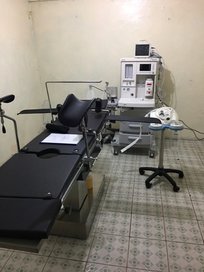 Newly Installed equipment ready for 'the ribbon cutting'
Newly Installed equipment ready for 'the ribbon cutting'
Monday, March 20th
Monday was a very full day. When we arrived at Imara in the morning we found that the medical engineer had been there earlier in the morning and unpacked the crates and the equipment was ready for viewing. Sidy and her team from RC Syokimau were there decorating the reception room with streamers and getting everything ready for the ribbon cutting ceremony.
The reception got underway about 11am with speeches from Peter, Sidy, one of RC Syokimau’s sponsors, DGN Jeff Bamford and myself. We then went to the Operating Room for the ribbon cutting ceremony by DGN Bamford and myself followed by Francesca’s explanation about the use of the equipment. She also outlined their future equipment needs and one of the Rotarians from Madras, India indicated to me that if we put together a Global Grant application we could look to his club for support.
Monday was a very full day. When we arrived at Imara in the morning we found that the medical engineer had been there earlier in the morning and unpacked the crates and the equipment was ready for viewing. Sidy and her team from RC Syokimau were there decorating the reception room with streamers and getting everything ready for the ribbon cutting ceremony.
The reception got underway about 11am with speeches from Peter, Sidy, one of RC Syokimau’s sponsors, DGN Jeff Bamford and myself. We then went to the Operating Room for the ribbon cutting ceremony by DGN Bamford and myself followed by Francesca’s explanation about the use of the equipment. She also outlined their future equipment needs and one of the Rotarians from Madras, India indicated to me that if we put together a Global Grant application we could look to his club for support.
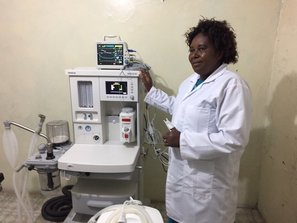 Here Francisca demonstrates some of the new equipment
Here Francisca demonstrates some of the new equipment
A vegetarian meal was then served and after a period of fellowship, the guests left just before Mona and I held a meeting with the Imara Healthcare Workers at 2pm.
They all felt that the training Rotary Eganville supported in 2015-16 had given them the skills to provide home-based care in their communities in the Mukuru slum. The challenge however was to find employment as there were no opportunities in the health sector, even for one of them who had taken full time training as a community health worker for over two years and still couldn’t find employment in her field.
We then discussed ways Rotary could provide support through micro finance to generate income to support their families so that they could continue their volunteer work in the health field. They have already formed a ‘table banking’ group whereby they each put money into a pot every month then take turns borrowing from this group fund. Options discussed for business opportunities were tailoring, office cleaning, selling solar lanterns and providing a motor cycle ambulance service. We agreed to look into that option. One of the members is an electrician and is interested in the solar lantern option, so we indicated we would consider that option also.
After that meeting, we met with the Imara Women’s Support Group for HIV+ mothers. We had worked on an application for a grant from the Women’s Inter Church Council of Canada (WICC) to enable the group to develop a business selling peanut butter products in the slum. However, at the last minute they changed their mind and said they wanted to sell kerosene instead. So the Group submitted a proposal to WICC for the purchase of equipment to sell kerosene. We discussed that decision and the group decided that they would like to submit two applications – one for kerosene, which has already been submitted and another for peanut butter which RC Eganville had agreed to sponsor. So we will be working with one of the members of the group to develop a budget for the peanut butter business.
They all felt that the training Rotary Eganville supported in 2015-16 had given them the skills to provide home-based care in their communities in the Mukuru slum. The challenge however was to find employment as there were no opportunities in the health sector, even for one of them who had taken full time training as a community health worker for over two years and still couldn’t find employment in her field.
We then discussed ways Rotary could provide support through micro finance to generate income to support their families so that they could continue their volunteer work in the health field. They have already formed a ‘table banking’ group whereby they each put money into a pot every month then take turns borrowing from this group fund. Options discussed for business opportunities were tailoring, office cleaning, selling solar lanterns and providing a motor cycle ambulance service. We agreed to look into that option. One of the members is an electrician and is interested in the solar lantern option, so we indicated we would consider that option also.
After that meeting, we met with the Imara Women’s Support Group for HIV+ mothers. We had worked on an application for a grant from the Women’s Inter Church Council of Canada (WICC) to enable the group to develop a business selling peanut butter products in the slum. However, at the last minute they changed their mind and said they wanted to sell kerosene instead. So the Group submitted a proposal to WICC for the purchase of equipment to sell kerosene. We discussed that decision and the group decided that they would like to submit two applications – one for kerosene, which has already been submitted and another for peanut butter which RC Eganville had agreed to sponsor. So we will be working with one of the members of the group to develop a budget for the peanut butter business.
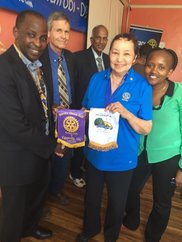
Our meeting with the Women’s Support Group ended about 4pm in time for us to take a taxi across Nairobi’s heavily congested streets to Westlands where we attended a meeting of the Rotary Club of Muthaiga. Barrack picked us up at 8pm and we returned home for a late meal and early to bed.
Pictured is Eganville Rtn. Mona Fox exchanging banners with President Leonard of Rotary Muthaiga. Looking on PDG District 7040 Bill Gray, Rtn. Krish and Rtn. Mariam
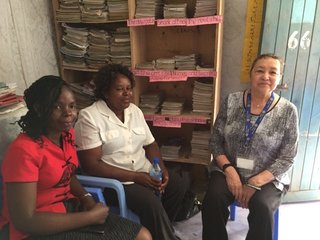 Library at Siloam School
Library at Siloam School
Tuesday, March 21st
Tuesday was the day to visit the Siloam School in the Mukuru kwa Njenga slums where we had enabled a donation of 225 books from the National Book Development Council of Kenya.
The Siloam School is actually three schools. It opened in 2010 with 24 students and now has almost 2000 students. We visited two of these schools in the centre of the slum and at one of the schools, experienced a wonderful performance of poetry, song and dance welcoming us to their school.
We saw the story books that had been donated and it was obvious that they had been well used. The students told us that the books had helped their composition and English language. Their performance certainly demonstrated that.
.
Tuesday was the day to visit the Siloam School in the Mukuru kwa Njenga slums where we had enabled a donation of 225 books from the National Book Development Council of Kenya.
The Siloam School is actually three schools. It opened in 2010 with 24 students and now has almost 2000 students. We visited two of these schools in the centre of the slum and at one of the schools, experienced a wonderful performance of poetry, song and dance welcoming us to their school.
We saw the story books that had been donated and it was obvious that they had been well used. The students told us that the books had helped their composition and English language. Their performance certainly demonstrated that.
.
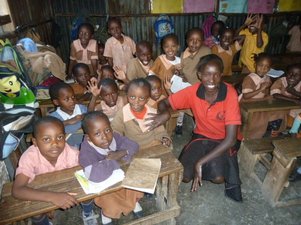 Saloam Students eager to learn
Saloam Students eager to learn
The children pay nominal fees to attend the school but some can’t afford fees and others don’t have food at home, so go hungry and are unable to learn. We discussed with the Head Master, Joel Nzuki, ways we could help support these children and one idea that we discussed was to buy chickens for them. The sale of eggs and meat birds could then be used to pay for meals for those children without food
Wednesday, March 22nd
Wednesday was our day to join the Canada-India Friendship Delegation as they visited projects supported by Nairobi Rotary clubs. We had to meet the delegation in the parking lot of their hotel at 8.30am and given the horrendous traffic congestion in Nairobi we left the house at 5.55am. Barrack leaves home for work at that hour every day and his commute in stop and start traffic takes two and a half hours.
In the morning we visited the St Catherine’s School where Rotary Millimani had provided support for the school library. The school was well resourced with concrete block classrooms and a good library in sharp contrast with our visit to the Siloam School the previous day.
After our morning at the school we went to the Nairobi Club for the weekly meeting of the Millimani Rotary club. It was our third visit to Millimani Rotary and we were warmly welcomed by members we had met before. I spoke about changes at Imara and received many complementary remarks on our accomplishments.
In the afternoon we visited two projects supported by Rotary Karen: The Karen Technical Institute for the Deaf and a Library and Sanitation project in the Kuwinda slum. The latter was particularly interesting. The library is a converted container and is used for stocking the books and as a well used reading room. It has solar lighting and a solar panel on the roof.
The slum is tiny compared with the expansive Mukuru kwa Njenga slum but is noticeable by the lack of garbage. Rotary Karen have installed garbage containers along the road through the slum and the community clean the street first thing every morning.
After Kuwinda we went to the Karen Golf and Country club where we had some time to relax before Rotary Karen held their weekly meeting. Once again, Rotary Eganville and partners were praised for our Imara project.
We learned from one of their members that Oxford University Press is donating 50,000 text and story books to Kenya schools, to celebrate their Rotary District's 100 anniversary. We informed Joel at Siloam School of this initiative and even though the deadline had passed, the Rotarian handling the project agreed to accept their application.
It was quite late by the time the meeting finished so we didn’t get home until about 10pm. As we had got up at 5am we were ready for bed.
Wednesday was our day to join the Canada-India Friendship Delegation as they visited projects supported by Nairobi Rotary clubs. We had to meet the delegation in the parking lot of their hotel at 8.30am and given the horrendous traffic congestion in Nairobi we left the house at 5.55am. Barrack leaves home for work at that hour every day and his commute in stop and start traffic takes two and a half hours.
In the morning we visited the St Catherine’s School where Rotary Millimani had provided support for the school library. The school was well resourced with concrete block classrooms and a good library in sharp contrast with our visit to the Siloam School the previous day.
After our morning at the school we went to the Nairobi Club for the weekly meeting of the Millimani Rotary club. It was our third visit to Millimani Rotary and we were warmly welcomed by members we had met before. I spoke about changes at Imara and received many complementary remarks on our accomplishments.
In the afternoon we visited two projects supported by Rotary Karen: The Karen Technical Institute for the Deaf and a Library and Sanitation project in the Kuwinda slum. The latter was particularly interesting. The library is a converted container and is used for stocking the books and as a well used reading room. It has solar lighting and a solar panel on the roof.
The slum is tiny compared with the expansive Mukuru kwa Njenga slum but is noticeable by the lack of garbage. Rotary Karen have installed garbage containers along the road through the slum and the community clean the street first thing every morning.
After Kuwinda we went to the Karen Golf and Country club where we had some time to relax before Rotary Karen held their weekly meeting. Once again, Rotary Eganville and partners were praised for our Imara project.
We learned from one of their members that Oxford University Press is donating 50,000 text and story books to Kenya schools, to celebrate their Rotary District's 100 anniversary. We informed Joel at Siloam School of this initiative and even though the deadline had passed, the Rotarian handling the project agreed to accept their application.
It was quite late by the time the meeting finished so we didn’t get home until about 10pm. As we had got up at 5am we were ready for bed.
Thursday, March 23rd
Thursday was a day for relaxation. I spent some time going over my presentation to Rotary Syokimau that evening then we left the house with Isabella in the late afternoon to see her gym.
The meeting of Rotary Syokimau went well and the club is solidly behind Eganville’s Imara initiative. In fact, we learned that they have a fundraising dinner planned to raise funds for Imara. Moreover, one of their past members, who we had met in 2015, offered to buy a motor cycle for the Community Health Workers self support group.
Thursday was a day for relaxation. I spent some time going over my presentation to Rotary Syokimau that evening then we left the house with Isabella in the late afternoon to see her gym.
The meeting of Rotary Syokimau went well and the club is solidly behind Eganville’s Imara initiative. In fact, we learned that they have a fundraising dinner planned to raise funds for Imara. Moreover, one of their past members, who we had met in 2015, offered to buy a motor cycle for the Community Health Workers self support group.
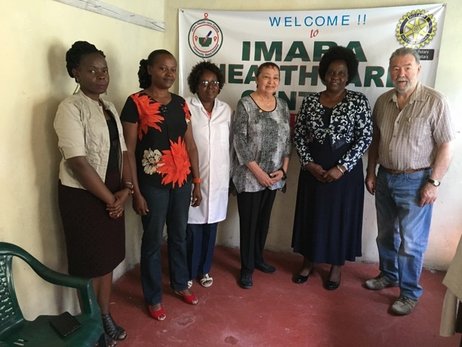 With staff from the National Book Development Council of Kenya. L-R Anne Lauvusa, Emily Kago, Francisca, Mona, Ruth Odondi and Alan
With staff from the National Book Development Council of Kenya. L-R Anne Lauvusa, Emily Kago, Francisca, Mona, Ruth Odondi and Alan
Friday, March 24th
We had a morning meeting at Imara with Ruth Odondi from the National Book Development Council of Kenya who wanted to meet us. Then we had a meeting with Peter and Francisca to discuss their priorities for future development of the Centre.
They didn’t fully spend the funds allocated for the OR equipment purchase as they had been able to negotiate a discount. I told them that they should indicate how they would like to spend these funds and I would submit their request to the District Grants Committee for approval. They also spent considerable funds on structural changes to accommodate the new Operating Room and I asked them to send me copies of their bills and I would incorporate their contribution into my final report on the equipment purchase project.
A number of additional items are needed to make the OR fully operational. These include lighting, air conditioning, a 50 litre autoclave and another patient monitor for the post op room. I asked that they prioritize their equipment needs and send me a list with quotations for costs. When we return to Canada I will start work on preparing a Global Grant application to seek funds for the next phase in the Centre’s development.
After a useful and productive exchange with Peter and Francisca, we met the Community Health Workers. They agreed that they would like to purchase a motorcycle, or a bodaboda as they are referred to in Kenya. This would be painted with the Imara logo and would have a Sim card installed for security and also to monitor use. The bodaboda would be used as an ambulance capable of negotiating the narrow lanes and uneven roads in the slums. We agreed to look into the matter. We also discussed the possible purchase of solar lanterns from the agent in Kenya from Glenergy of Petawawa, Canada.
We had a morning meeting at Imara with Ruth Odondi from the National Book Development Council of Kenya who wanted to meet us. Then we had a meeting with Peter and Francisca to discuss their priorities for future development of the Centre.
They didn’t fully spend the funds allocated for the OR equipment purchase as they had been able to negotiate a discount. I told them that they should indicate how they would like to spend these funds and I would submit their request to the District Grants Committee for approval. They also spent considerable funds on structural changes to accommodate the new Operating Room and I asked them to send me copies of their bills and I would incorporate their contribution into my final report on the equipment purchase project.
A number of additional items are needed to make the OR fully operational. These include lighting, air conditioning, a 50 litre autoclave and another patient monitor for the post op room. I asked that they prioritize their equipment needs and send me a list with quotations for costs. When we return to Canada I will start work on preparing a Global Grant application to seek funds for the next phase in the Centre’s development.
After a useful and productive exchange with Peter and Francisca, we met the Community Health Workers. They agreed that they would like to purchase a motorcycle, or a bodaboda as they are referred to in Kenya. This would be painted with the Imara logo and would have a Sim card installed for security and also to monitor use. The bodaboda would be used as an ambulance capable of negotiating the narrow lanes and uneven roads in the slums. We agreed to look into the matter. We also discussed the possible purchase of solar lanterns from the agent in Kenya from Glenergy of Petawawa, Canada.
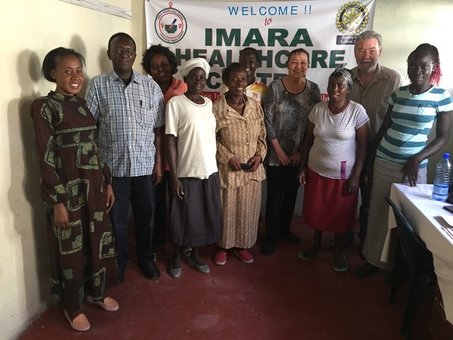 With some of the members of the Women's Support Group
With some of the members of the Women's Support Group
After the Community Health Workers, we met with the Women’s Support Group to discuss the peanut butter initiative. They agreed they would like me to submit a grant application to the Women’s Inter Church Council of Canada (WICC) and we discussed their budget needs.
After another full day, we returned to the comfort of Barrack and Isabella’s home and spent an enjoyable and relaxing evening with their family.
After another full day, we returned to the comfort of Barrack and Isabella’s home and spent an enjoyable and relaxing evening with their family.
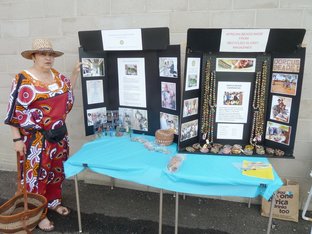 Mona Fox in tradition Kenyan garb selling Dorcus beads at Canada Day Breakfast July 2014
Mona Fox in tradition Kenyan garb selling Dorcus beads at Canada Day Breakfast July 2014
Saturday, March 25th
On Saturday we met Meble Birengo from the Dorcus Beads Cooperative for lunch at the Sarit Centre in Nairobi’s Westlands District. We have been selling these beads since we visited the rural Cooperative in 2012. Our purchases help support the communities in the Coop and the profits from the sale of these colourful paper beads in Canada goes to the Imara Healthcare Centre. Postage is expensive so we picked up a supply of bracelets and necklaces to take home with us.
In the afternoon we made arrangements for the purchase of ten solar lanterns to help kickstart the Community Health Workers self help group. We also made arrangements for a donation of 10,000 ksh ($130 CDN) to the Siloam School in the Mukuru slum with money that was given to us by two Canadians to give to a worthy cause. The money will be used to buy chicks and chicken feed to generate income which can be used by the school to feed hungry children.
Then in the evening Mona and I took the family out to dinner as a thank you for their warm and generous support. We were a large group as in addition to Barrack and Isobella and their two children, the group included Anita and Diane the nannies/house help, Isobella’s sister Uma, Barrack’s nephew, Michael and a friend of the children.
On Saturday we met Meble Birengo from the Dorcus Beads Cooperative for lunch at the Sarit Centre in Nairobi’s Westlands District. We have been selling these beads since we visited the rural Cooperative in 2012. Our purchases help support the communities in the Coop and the profits from the sale of these colourful paper beads in Canada goes to the Imara Healthcare Centre. Postage is expensive so we picked up a supply of bracelets and necklaces to take home with us.
In the afternoon we made arrangements for the purchase of ten solar lanterns to help kickstart the Community Health Workers self help group. We also made arrangements for a donation of 10,000 ksh ($130 CDN) to the Siloam School in the Mukuru slum with money that was given to us by two Canadians to give to a worthy cause. The money will be used to buy chicks and chicken feed to generate income which can be used by the school to feed hungry children.
Then in the evening Mona and I took the family out to dinner as a thank you for their warm and generous support. We were a large group as in addition to Barrack and Isobella and their two children, the group included Anita and Diane the nannies/house help, Isobella’s sister Uma, Barrack’s nephew, Michael and a friend of the children.
Sunday and Monday March 26th/27th
Sunday was a quiet day. We met my brother and his wife for lunch then in the evening met some of Barrack’s family, including his mother who was in Nairobi for a visit.
Our last item of business before we fly to London on an overnight flight tonight is to meet with the Community Health Worker to discuss their priorities. Some research on the internet identified a motor bike ambulance with a side-car adapted to carry a person lying down, which has been used successfully in South Africa, Uganda and other countries. As this would require a more substantial investment we plan further research on pricing and exploration of whether it could be included in a Global Grant application for Imara Healthcare Centre, which would include training for the Community Health Workers. Unfortunately, the Health Workers were disappointed with this decision as they wanted a bodaboda that they would own. Other money making alternatives were discussed including making candles, soap and office cleaning. They will discuss priorities further and get back to us with their preferences
Sunday was a quiet day. We met my brother and his wife for lunch then in the evening met some of Barrack’s family, including his mother who was in Nairobi for a visit.
Our last item of business before we fly to London on an overnight flight tonight is to meet with the Community Health Worker to discuss their priorities. Some research on the internet identified a motor bike ambulance with a side-car adapted to carry a person lying down, which has been used successfully in South Africa, Uganda and other countries. As this would require a more substantial investment we plan further research on pricing and exploration of whether it could be included in a Global Grant application for Imara Healthcare Centre, which would include training for the Community Health Workers. Unfortunately, the Health Workers were disappointed with this decision as they wanted a bodaboda that they would own. Other money making alternatives were discussed including making candles, soap and office cleaning. They will discuss priorities further and get back to us with their preferences
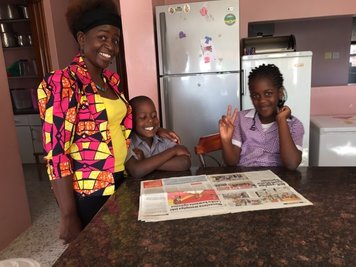 We are so grateful to our hosts: Rotarian Isabella and her husband Barrack and their children Gaudi and Tedd
We are so grateful to our hosts: Rotarian Isabella and her husband Barrack and their children Gaudi and Tedd
Final Reflections
As we prepare to leave Kenya tonight we can look back on an intensive but highly productive 12 days in the country. We have seen the Imara Healthcare Centre advance in its development as a caring community based facility which delivers heathcare services to the poor and marginalized in Mukuru kwa Njenga. We have launched an initiative to help the Imara Community Health Workers earn an income so that they can continue to volunteer to provide home based care to the elderly and infirm. We have mapped out a path to provide some support to the HIV mothers in the Women’s support Group.
In addition to our initiatives at Imara, we have established relations with the National Book Development Council of Kenya and through them seen the beginnings of a school library at the Siloam School. We have also helped the school expand their egg and meat-bird operation to help them feed needy children.
Our time with the Canada-India Friendship Delegation was interesting and we are hopeful that it might lead to additional funding partnerships as we seek additional support to purchase necessary additional equipment for Imara Centre’s Operating Room. Our time with the Delegation also enabled us to speak to Nairobi Rotary Clubs about our Imara Project and extend our network of Nairobi Rotarians.
We have also cemented strong relations with the Rotary Club of Syokimau and look forward to collaborating with them on future projects.
Finally, the glue that has held our work together is the exceptional hospitality of our hosts in Nairobi, Rotarian Isabella and her husband, Barrack. They have treated us like family. We’ve had lots of laughs and fun with them but they have also provided sound advice and an invaluable cultural context for our work. Our heart felt thanks to both of them.
As we prepare to leave Kenya tonight we can look back on an intensive but highly productive 12 days in the country. We have seen the Imara Healthcare Centre advance in its development as a caring community based facility which delivers heathcare services to the poor and marginalized in Mukuru kwa Njenga. We have launched an initiative to help the Imara Community Health Workers earn an income so that they can continue to volunteer to provide home based care to the elderly and infirm. We have mapped out a path to provide some support to the HIV mothers in the Women’s support Group.
In addition to our initiatives at Imara, we have established relations with the National Book Development Council of Kenya and through them seen the beginnings of a school library at the Siloam School. We have also helped the school expand their egg and meat-bird operation to help them feed needy children.
Our time with the Canada-India Friendship Delegation was interesting and we are hopeful that it might lead to additional funding partnerships as we seek additional support to purchase necessary additional equipment for Imara Centre’s Operating Room. Our time with the Delegation also enabled us to speak to Nairobi Rotary Clubs about our Imara Project and extend our network of Nairobi Rotarians.
We have also cemented strong relations with the Rotary Club of Syokimau and look forward to collaborating with them on future projects.
Finally, the glue that has held our work together is the exceptional hospitality of our hosts in Nairobi, Rotarian Isabella and her husband, Barrack. They have treated us like family. We’ve had lots of laughs and fun with them but they have also provided sound advice and an invaluable cultural context for our work. Our heart felt thanks to both of them.
